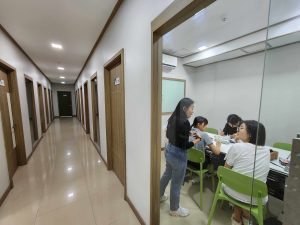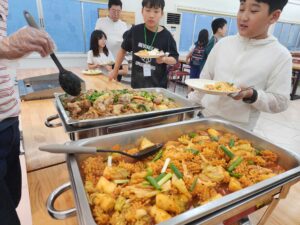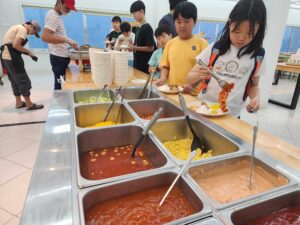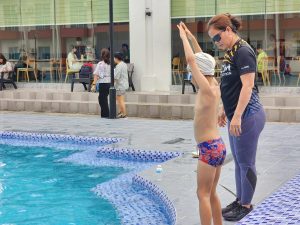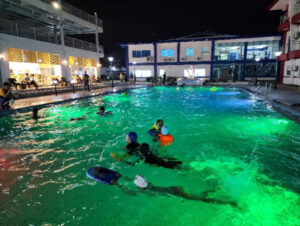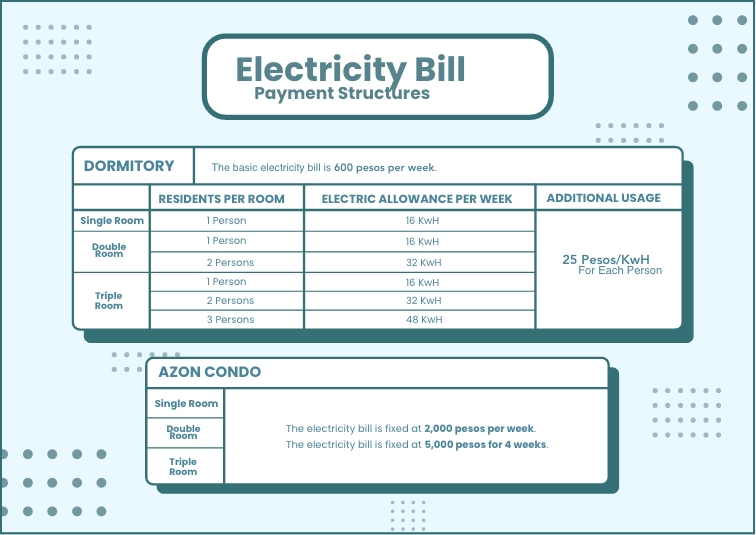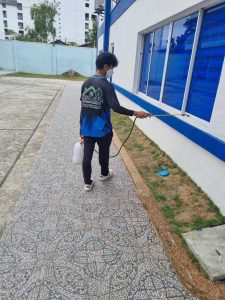Learn English the Right Way!
Get our live news. And if you have any questions, please contact us at any time through CONTACT US. We will respond kindly.
The following are guidelines for juniors and families. It covers class application, curriculum operation, class changes, textbooks, use of the swimming pool, regulations and penalties, etc.
For more detailed information, download the file below:
JUNIOR & FAMILY Guidelines
The two programs share common operational goals and characteristics, such as living in school-provided accommodation, enjoying English, and improving speaking skills, among other areas.
However, there are some differences:
| English Camp | Family Study Abroad | |
| Accommodation | Only used by 3-4 juniors. | Parents and juniors share a room. |
| Meals and Snacks | 3 meals a day and
a snack every evening. |
3 meals only |
| Junior Care | From waking up until bedtime, even outdoor activities are the responsibility of the school. | Primarily the parents’ responsibility, with the schools’ responsibility being secondary. |
| Study | 8-10 hours of classes per day, with mandatory after-school self-study. | 6-9 hours of classes per day, with after-school self-study being optional. |
| Activity | Saturday and Sunday activities are under school management. | Simple activities such as volunteer work or sports activities are managed by the school while going out or traveling is done with parents. |
| Expense | High cost | The cost for juniors is 70-80% of that of the camps; however, additional costs are incurred by the parents. |
English Camp:
Parents working may safely leave their children in an English environment for one or two months through the English camp. Weekend activities help juniors build social relationships and create study abroad memories in the Philippines. Choose an experienced and trustworthy school as camps manage life and safety on behalf of parents. However, challenges arise in meeting detailed needs due to ‘uniform operation’ in class management, teacher style, rest time, and teaching material management – common in most junior camps. Concerns also arise about potential low teacher quality as temporary, short-term teachers may not match regular ESL teachers in experience and trust.
Family Study Abroad:
Studying abroad with a family provides detailed support to juniors in English learning. Unlike schools relying on placement test results, parents can understand their junior’s strengths and weaknesses observed over years. They can monitor class schedules, textbooks, homework, etc., from the first week and make requests directly to the office. However, parents must manage both academics and daily lives, ensuring junior’s safety during activities and often accompanying them on weekends, which can be tiring.
In conclusion:
In terms of academic achievements, family training significantly outperforms English camps for juniors. Despite school efforts, meeting parents’ demands regarding juniors’ academic needs is challenging. If interested in offering various experiences during vacation in addition to studying English, an English camp may be a good alternative.
After breakfast, they start their day with either 1st period (from 08:00) or 2nd period (from 08:50). Classes last for 6 to 7 hours a day, and you can take a break or swim starting around 4 o’clock. After dinner, you can have some private time or participate in the evening program.
Classes
– From the age of 12, it is divided into Junior ESL, and from 11 years old, it is divided into Primary English. The two courses do not have different curricula, and since it is Primary English, the quality of the classes does not decrease. Even juniors with low English levels do not like being assigned to the same class as younger children, so we have separated the two courses.
– One-on-one classes focus on Speaking and Pronunciation, and subjects such as Reading & Vocabulary and Writing are also assigned. Listening and Grammar are conducted in small group classes.
– The important things in class assignments are (1) whether the teacher is a good match for the student, (2) is whether the class time appropriate for the student’s life rhythm, and (3) whether the textbooks are well assigned. These three factors are important factors for a student’s happy study abroad life, and we need the cooperation of not only our academic team but also parents to ensure their satisfaction.
– Of course, class content may be changed at the request of parents.
– The Junior IELTS course is specially managed by our school’s IELTS team.
Evening Program
– It lasts for 2 hours from 6 or 7 PM after dinner. This is a time to review what the student learned that day or do homework. Students can also use this time to write an English diary, memorize vocabulary, etc.
– For the evening program, one teacher is assigned to every 12 students. However, in special cases, one teacher may be assigned to every 2-5 students.
– The evening program is optional and not mandatory. Therefore, you can attend only one hour out of two, or attend every other day.
Buddy Report
After school, parents will receive a DAILY BUDDY REPORT. The Buddy Report serves as a reminder about what the junior/child learned that day, homework, etc.
Additionally, parents may make requests to the BUDDY TEACHER regarding class progress, and such requests will be conveyed to all teachers.
Special Vocabulary Class
Students in Junior ESL and Primary English courses are assigned one hour of vocabulary class separate from regular classes. Depending on the student’s level, students will memorize 20 to 35 words each day.
This class is optional and attendance is not mandatory.
Meals
Meals are three times a day and are the same on weekdays, weekends, and public holidays. The menu is buffet-style, and its composition varies depending on the nationality ratio of the students. For example, if there are a lot of Korean juniors, the proportion of Korean menu items increases.
The meal quality is generally well received by graduates.
Weekday activities
Class ends at 15:30 or 16:20. Afterwards, you can take a break, swim, do Zumba (twice a week), or watch a movie (once a week).
If you would like swimming lessons, we can invite an instructor from outside to introduce you to the parents.
Relaxation space for AZON CONDO users
For AZON users, one classroom is operated as a rest area. Here, you can store your luggage or spend some private time. Of course, you can also use the cafeteria or study hall.
Weekend activities
You can enjoy resort tours, hopping, scuba diving, restaurant tours, and even short trips by renting a car. We have posted related information on the school bulletin board, so please refer to it.
Electricity billing in the Philippines tends to be higher compared to other countries, and ESL schools often impose surcharges. Therefore, it is advisable to adopt energy-saving habits.
An electricity bill typically includes a basic charge and an additional charge. Conserving power can help keep your charges within the basic electricity bill, while leaving appliances on constantly may lead to significant extra fees.
DORMITORY
In dormitories, electricity bills are categorized into basic and additional charges. Weekly announcements detail the electricity consumption in each room.
- Basic electricity bill: P2,400 for 4 weeks, averaging P600 per week.
- Additional electricity bill: If usage exceeds 16 KWH per person per week, a surcharge of P25 per 1 KWH applies. The additional amount is shared equally among the room occupants.
AZON CONDO
Azon Condo follows a similar billing structure, consisting of basic and additional charges.
- Basic electricity bill: P5,000 for 4 weeks, with graduated rates for shorter periods (P2,000 for 1 week, P3,000 for 2 weeks, and P4,000 for 3 weeks).
- Additional electricity bill: Exceeding P5,000 in total usage for 4 weeks incurs extra charges, which will be notified during the graduation day.
Dormitory and AZON CONDO rooms undergo cleaning twice a week and disinfection every 2 to 4 weeks, minimizing the presence of ants or cockroaches.
However, leaving snacks or food in the room may attract ants. If you notice bugs, please inform the office, and we’ll arrange more frequent cleaning for your room.
Promotions
Don’t miss out on the advantages that Philinter Academy’s exclusive promotions.
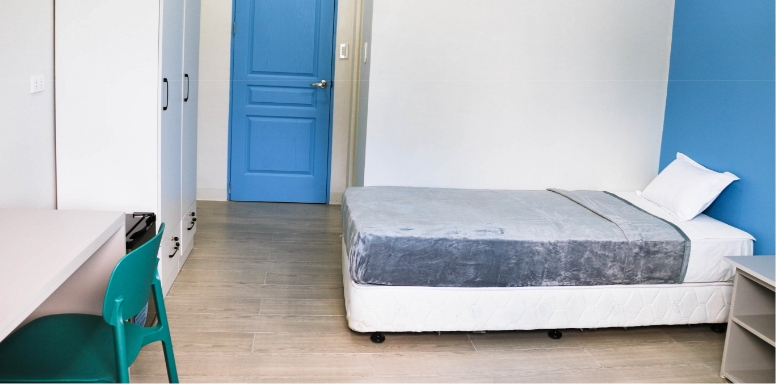
Your Home Away from Home
Our dormitory caters to students’ essential needs with comfortable living spaces featuring cozy beds, organized closets, in-room fridges, dedicated study desks, and private bathroom facilities, fostering a conducive environment for academic success and personal well-being.
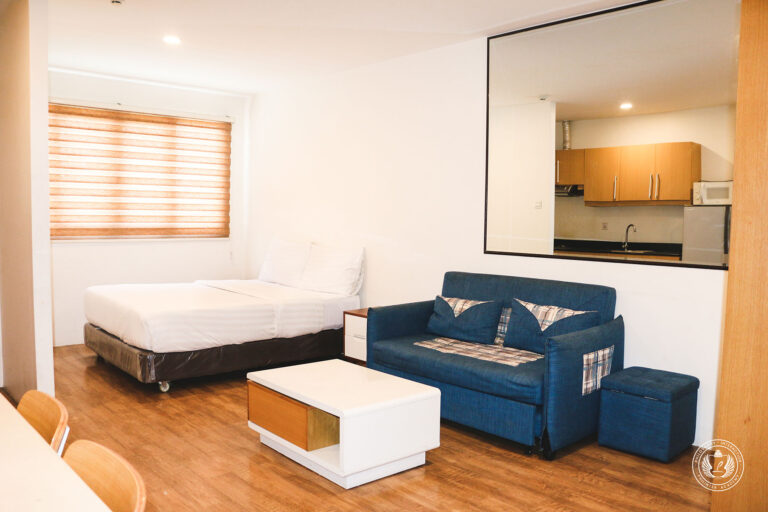
Azon Condo: Your Gateway to Contemporary Urban Living
ZON CONDO provides a comfortable living space for students. Each room is equipped with essential furnishings, including a bed, air conditioner, kitchenette, helves, a washing machine, and a private bathroom with a hot shower.
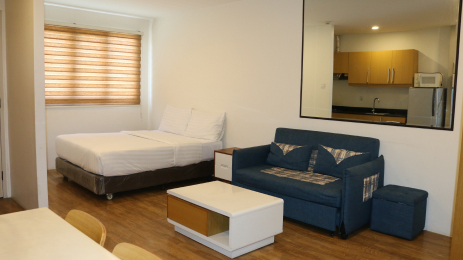
Make memories of studying abroad in Cebu!
- A lodging environment that respects privacy and is not bound by school regulations.
- You can cook in your room, and there is no curfew.
- You can cook in your room, and there is no curfew.



